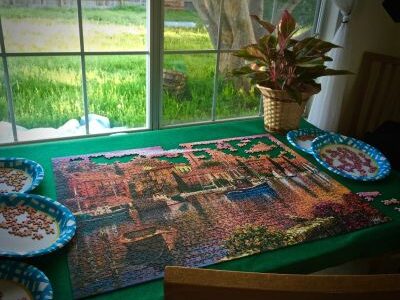A few months before he disappeared, he wrote most poignantly to General Chambe about one of his greatest concerns: “There is only one problem, only one: to rediscover that the life of the spirit is more important than the life of the mind.” (…) We can no longer live with refrigerators, politics, balance sheets and puzzles, you get it! I don’t care if I die in war. (…) But if I come back alive, there will be only one problem for me. What can we say to people!”
The answer is: “Getting closer to God!”
Nineteen hundred: It was the year that Nietzsche (1844–1900) died and Saint-Exupéry (1900-1944) was born. This period in which Exupéry lived was a time of upheaval and turmoil unprecedented in modern history. The First World War, the Great Depression of 1929, the Franco-German War and the World War II shook the Christian worldview that had dominated the world for 2000 years. Through his well-known maxim, Nietzsche revealed the crisis of modernity in Western Civilization and predicted the coming of nihilism, declaring the end of traditional Western Christian cultural philosophy after the industrial revolution. People began to doubt God. This situation caused panic among intellectuals in the Western world and led them to seek new religious reform. Observing the soul-destroying materialistic conformism of Communism, Exupéry was disgusted with the systems that destroyed spiritual things and the ones that imposed an ever higher standard of living as the goal of life.
“I hate this era with all my might. The human spirit is dying of thirst […] When [France] is liberated, the fundamental problem of our time will be revealed. This is the meaning of man,
and no answer is offered to it. I have the impression that I am walking towards the darkest times of the world.” The main reason for Exupéry’s concern was not limited by the wars, the occupation of France and the German problem. The source of his anxiety came from much further realms. Even the thought of the liberation of France and the end of the wars did not satisfy him.
There was no less abomination in the world of the 1940s than there is today, but Exupéry told the world about none of it. He wrote The Little Prince, full of love, friendship and human values, in the middle of a terrible war like World War II. The Little Prince, published today with 400 official translations and 26 different alphabets, attracted the attention of a wide and diverse audience. Just like its author, who traveled across Europe, Africa, America and Asia, The Little Prince crossed cultural barriers and reached war-torn consciences in every corner of the world. Theologians, ordinary citizens, politicians, and intellectuals believed that this was a spiritual novel. If The Little Prince had not provided such purification, the cathedrals and churches in Europe at that time could have been destroyed by riots and the priests would have been the first targets of terror.
Even today, The Little Prince is used for psycho-social support for primary school students affected by conflict in Northern Iraq. The Little Prince helps with the problems that trouble children’s lives, such as war, family trauma and displacement. I think nothing else in this world could console the sufferers better than The Little Prince of Exupéry.
“My two greatest sources of inspiration to shape my inner self are Antoine de Saint Exupéry and Jesus Christ.” Stan Rougier.
Stan Rougier, who is the most listened to priest by young people in France today, says that he found God with The Little Prince, which he read when he was 17 years old. (Although the word God is never mentioned in The Little Prince). The work that touched Father Rougier the most and enabled him to enter the priesthood was The Castle. “I will put poets and priests in charge of my city. And they will make people’s hearts bloom.” (The Castle). Father Rougier, who accepts Exupéry as his spiritual Master, is today the spiritual guide of young criminals, a caregiver in Africa, a priest of the Evyr-Corbeil diocese, a radio and television preacher, a columnist and the author of forty books. One of the books he authored is What Can We Say to People?
Exupéry opens the door to the path to God by renewing the language of the search for God. With The Little Prince, or rather through the language of nature, he manages to awaken the seeds buried in the holy books. The Little Prince, which is the most read in the world today after the Qur’an and the Bible, has become one of the rare mystical works that remind Muslims, Jews and Christians of the return to nature. Then he builds the Castle, which will enable him to discover the actions that exalt man and push him to decay, and to protect the essence of man. Page after page with goodness, truth and beauty. The little prince is a desert prince who travels among his father’s empire in the Castle, pondering their tragedies and weighing possible solutions to their troubles. He tries figurative expressions that give rise to the desire for God within us without saying God and provide the conditions for being able to hear the word of God in our hearts. The Father, a metaphor for the Lord; A Sentinel, a metaphor for the Prophet; journeying through the desert as a metaphor for life; like the Castle, which is a metaphor for humans.
What Would Have Happened If He Had Survived the War?
“Man’s true existence is his action.” Friedrich Hegel.
Frankly, he thought that humanity was no longer rising on the intellectual spectrum and was, in fact, falling. Although he was a brilliant writer, instead of calling himself a writer, he would say, “I am a pilot.”
He had a close relationship with the literary world and was contemporary with many famous writers of that time such as Louis Aragon, Andre Breton and Paul Eluard that were born in 1897, 1896 and 1895, respectively. Although he once loved surrealist poetry, he had little contact with it. He met Ernest Hemingway and John Dos Passos in Spain, but never established a close relationship with them. He never talked about his literary ideas in the popular cafes of Montparnasse and Saint Germain in Paris at the time.
To him the pursuit of anything other than living truth was a waste of time, and he was not shy about expressing his disdain for poetic words that adorn trite, superficial or playful thoughts. He was a man who sincerely refused to separate action from thought, viewing behavior as the measure of faith and faith as the necessary source of all right behavior. He himself constantly tried to believe in everything he did and to do only what he could believe in.
He’s been feeling bad lately. His whole body was giving him pain, and he was climbing into the cockpit as if he were entering a coffin. He revealed his true self, which he had hidden from his comrades, in a letter he wrote to his wife Consuelo, astonishing the imagination: “I have had many accidents. Now I can’t even jump with a parachute. My lungs have been tormenting me for three days, I feel sick every second day. And there is noise in my ears day and night.”
Exupéry never looked for a more comfortable and quieter place where he could sit outside and wait out the storm. On the contrary, he was always at the very epicenter of events and where they were most difficult. And when the war began, no one doubted that Exupéry could not stay out. It’s not because he’s an adventurer or brave. Because he can’t stay away from the little girl’s pain and tears…
“Oh God! I desire to instill nobility in my warriors and adorn the temple where people dedicate themselves, making it the very essence and purpose of their lives. But tonight, while walking in the desert of my love, I saw a little girl. She cried. I turned her towards me and looked into her eyes. Her pain dazzled me. Lord, if I neglect her, I will neglect one of the particles of the world and my creation will not be completed. I do not give up on big goals, but I do not want the baby to cry either.”
He had reached such spiritual transcendence, such a height, that he could no longer descend into the human world. There were only two solutions for him:
Either to be killed in battle or…




